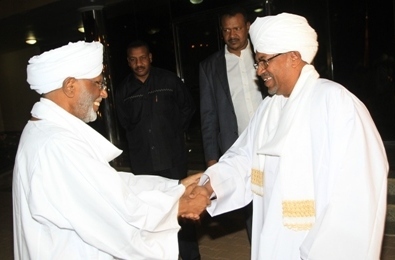Sudan’s PCP offers rare praise of NCP, criticises opposition parties
May 11, 2014 (KHARTOUM) – The Popular Congress Party (PCP) Kamal Omer affirmed that they will not endorse any attempt to remove the ruling National Congress Party (NCP) by force even if the ultimate goal is to achieve a democratic system.

The PCP official said that their position on the national dialogue initiative called for by president Omer Hassan al-Bashir earlier this year has surprised their peers in the other opposition parties.
He urged the Sudanese presidential assistant Ibrahim Ghandour who was present at the forum, not to move the dialogue abroad and criticised those who say that their acceptance of dialogue means a move towards uniting Islamists.
But Omer said that they will unite sooner or later and that it “needs no consultation”.
He said that PCP leader Hassan al-Turabi prevented bloodshed of the Muslim Brotherhood inside and outside Sudan and was able to move all issues into one direction.
The Islamists split in 1999 following a bitter power struggle between Bashir and Turabi, with the latter subsequently ousted from his post as parliament speaker.
Turabi later established the PCP and has since been a vociferous critic of the very regime for which he orchestrated the army-backed seizure of power in 1989.
Following the toppling of Egyptian president Mohamed Morsi, who belonged to the Islamist Muslim Brotherhood, Omer said that they were disappointed that Sudanese opposition backed his ouster even though he was democratically elected.
In a TV interview recently, Omer said they realised that Sudanese opposition will agree to democracy as long as it does not bring Islamists.
He suggested that this made them more aware about the need to seek to reconcile Islamists to face other forces.
Omer, who is known for his fierce criticism of the ruling party in the past, said that he entered the NCP headquarters “and feel no crisis in my heart”.
He also slammed the parties that did not participate in the dialogue adding that all political parties in Sudan should review their composition towards democratic thinking.
Turabi’s right-hand man stressed that his position is not aimed at defending the NCP but nonetheless hailed the ruling party’s democratic practices with opposition parties through allowing it to express its views in open air and through media.
Omer underscored that the NCP granted the opposition parties what they asked for emphasising that they will no longer wait for them to begin dialogue.
Last January, Bashir called on political parties and armed groups to engage in a national dialogue to discuss four issues, including ending the civil war, allowing political freedoms, fighting against poverty and revitalising national identity.
He also held a political roundtable in Khartoum last month with the participation of 83 political parties. The opposition National Umma Party (NUP) and the PCP are the only major opposition parties to accept Bashir’s call for national dialogue so far.
The opposition alliance of the National Consensus Forces (NCF) boycotted the political roundtable, saying the government did not respond to its conditions.
The NCF wants the NCP-dominated government to declare a comprehensive one-month ceasefire in Darfur, South Kordofan and Blue Nile. In addition it has called for the issuing of a general amnesty, allowing public freedoms and the release of all political detainees.
Bashir instructed authorities in the states and localities across Sudan to enable political parties to carry out their activities inside and outside their headquarters without restrictions except those dictated by the law.
The Sudanese president also pledged to enhance press freedom so that it can play its role in the success of the national dialogue unconditionally as long they abide by the norms of the profession.
Political detainees who have not been found to be involved in criminal acts will be released, Bashir said.
(ST)
